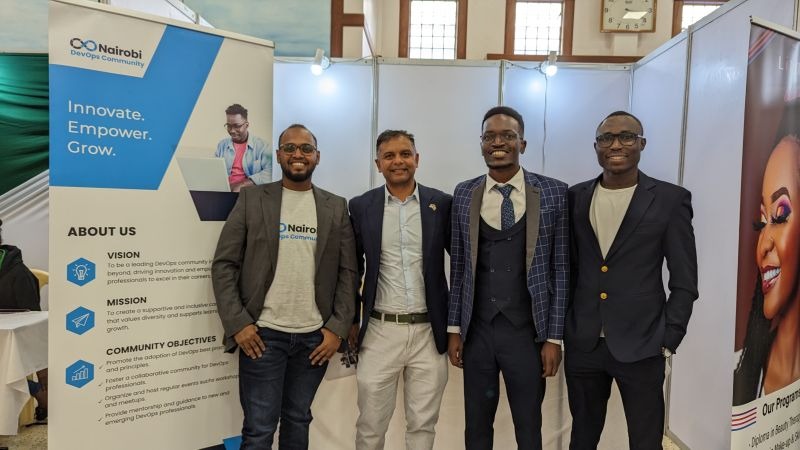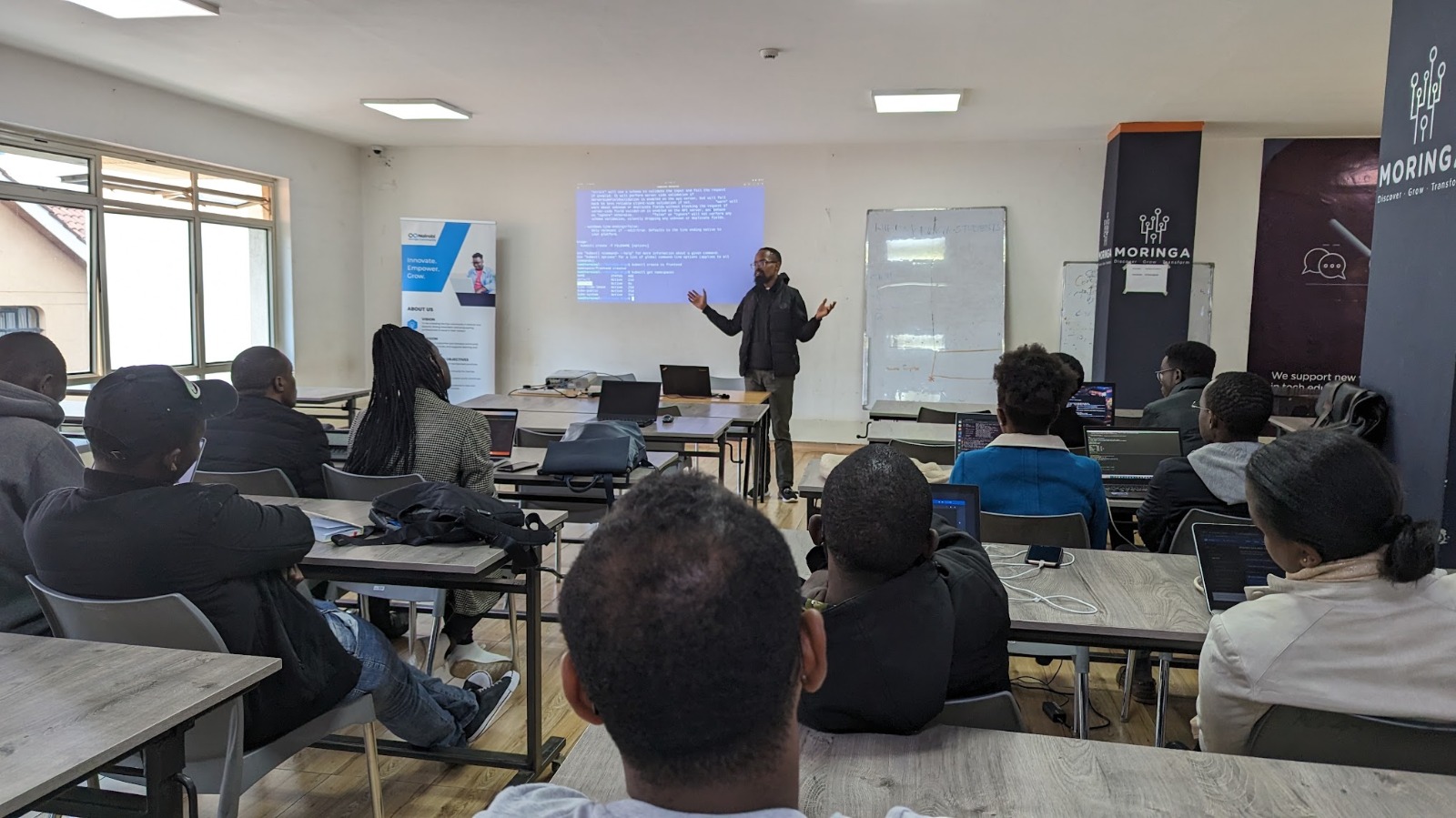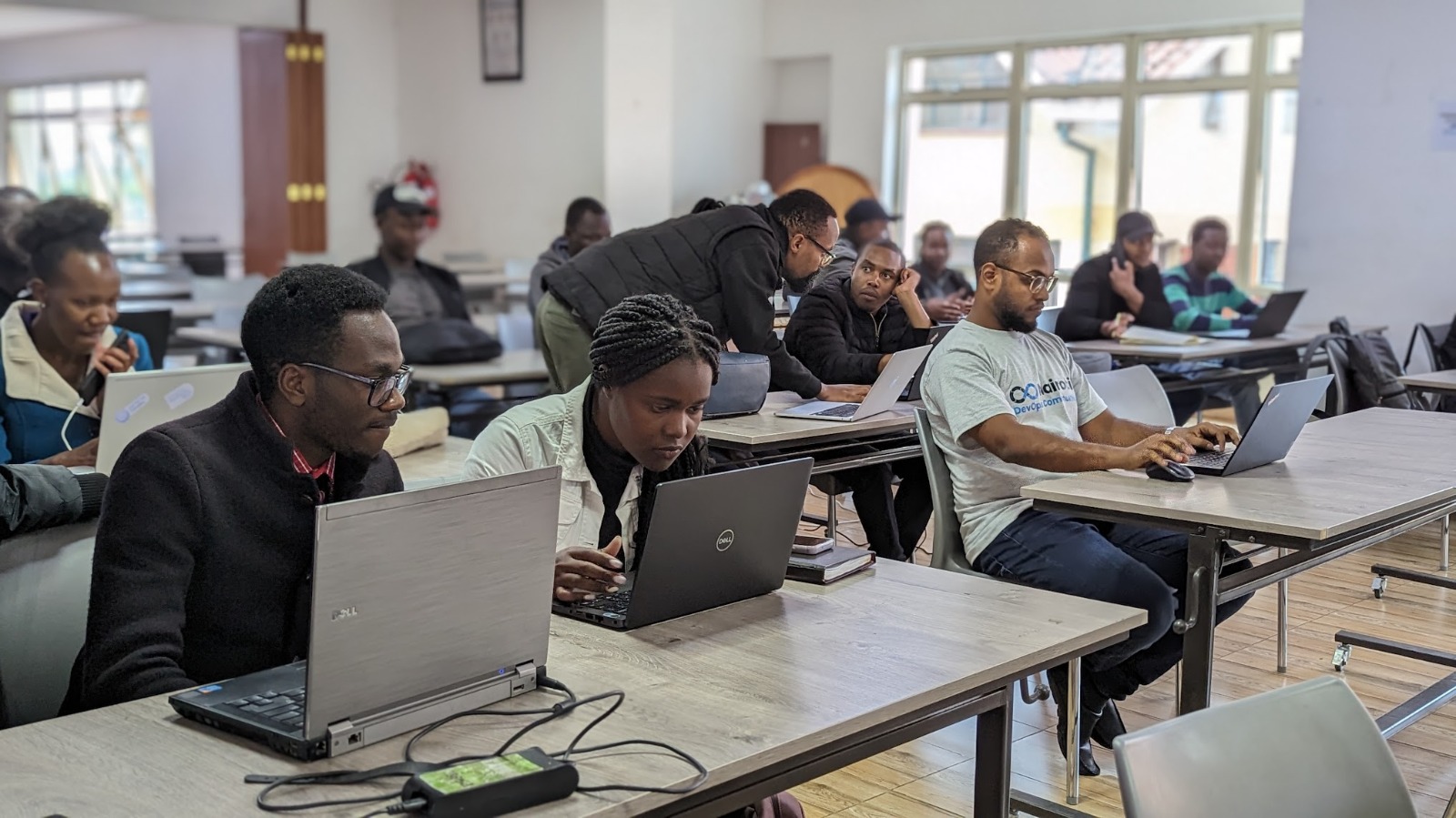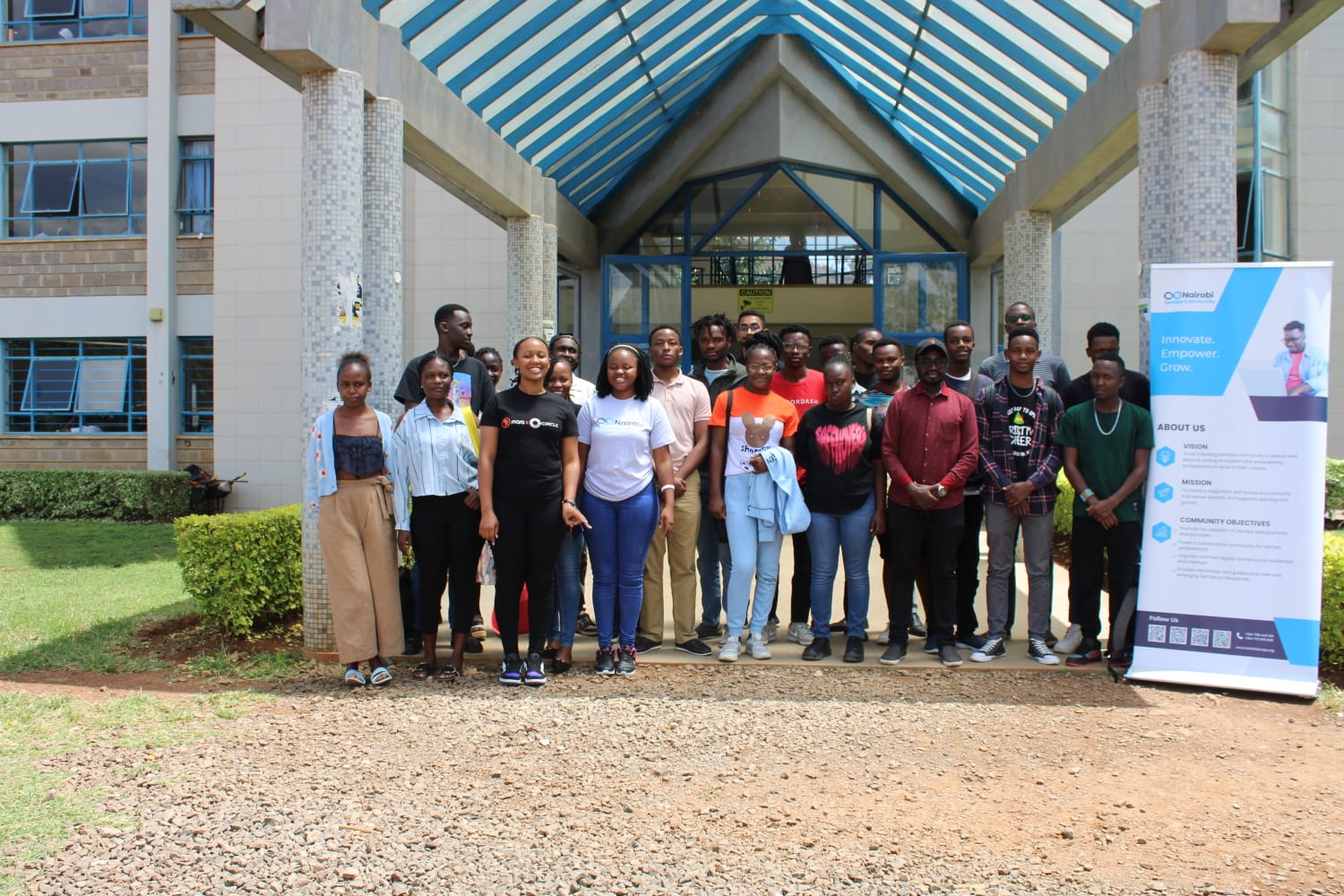Interview: Eye on DevOps Industry in Nairobi

Rather than aiming to remove humans entirely from the process, the goal should be to augment human capabilities and enhance collaboration between humans and machines.
NAIROBI, Kenya, April 26, 2024/-- Today, we have an expert who will hopefully save us from being lost in a roiling sea of tech anxieties, buzzwords, and AI generated clickbait. Kadima seeks to invite us to an interesting world of automation, and clears much of the current noise.
In this edition, we delve into DevOps work in Nairobi, the value proposition, building a community, and much more.
Let Kikao begin...
[Question 1] Kadima welcome to Kikao. Introduce yourself?
Thank you for having me, Phineahs. My name is Samuel Kadima, and I'm deeply involved in the DevOps community here in Nairobi. I'm passionate about the transformative power of DevOps methodologies and how they can drive efficiency and collaboration within organizations. As a DevOps engineer, technical trainer, writer, and speaker, I'm dedicated to sharing knowledge and fostering collaboration among professionals in this field. I believe in the importance of community engagement and continuous learning, which is why I'm excited to be a part of initiatives like Kikao.
[Question 2] Who is a DevOps engineer? And what is it like working in Kenya?
A DevOps engineer is a professional responsible for bridging the gap between software development and IT operations. They work to streamline the software delivery process by implementing automation, continuous integration/continuous deployment (CI/CD) pipelines, and infrastructure as code (IaC) practices. DevOps engineers also focus on collaboration, communication, and cultural changes within an organization to promote agility and efficiency.
As for working in Kenya, the DevOps landscape is dynamic and growing. Organizations in Kenya are increasingly recognizing the importance of DevOps practices in accelerating their software delivery cycles and improving overall operational efficiency. However, there are still challenges such as a shortage of skilled professionals, the need for more awareness and adoption of DevOps practices, and infrastructure limitations in some areas. Despite these challenges, the DevOps community in Kenya is vibrant and supportive, with various meetups, conferences, and networking events happening regularly to exchange knowledge and experiences.
[Question 3] This is a relative new industry with hopes of basically easing workload through automation. What is its true value proposition to the current market?
The true value proposition of DevOps to the current market lies in its ability to enhance agility, collaboration, and efficiency across the entire software development lifecycle. Here are some key aspects of DevOps' value proposition:
1. Accelerated Time to Market: By automating processes such as testing, deployment, and infrastructure provisioning, DevOps enables organizations to release software faster and more frequently. This speed to market gives companies a competitive edge by allowing them to respond quickly to changing customer needs and market demands.
2. Improved Collaboration: DevOps fosters a culture of collaboration and communication between development, operations, and other stakeholders. By breaking down silos and promoting cross-functional teamwork, DevOps enables faster problem-solving, innovation, and decision-making.
3. Enhanced Quality: Through practices like continuous integration and continuous deployment, DevOps helps to identify and address issues early in the development cycle. This results in higher-quality software with fewer defects, reducing the risk of costly errors and downtime in production environments.
4. Increased Efficiency: Automation is at the core of DevOps, allowing teams to automate repetitive tasks and streamline workflows. This automation reduces manual effort, minimizes errors, and frees up valuable time for teams to focus on more strategic initiatives.
5. Scalability and Resilience: DevOps practices such as infrastructure as code (IaC) enable organizations to provision and manage infrastructure resources programmatically. This scalability and resilience allow businesses to handle spikes in demand, optimize resource utilization, and maintain system reliability even in complex, distributed environments.
[Question 4] How are you building a supportive, inclusive, and vibrant community?
To foster a supportive, inclusive, and vibrant DevOps community, we organize a variety of events and initiatives aimed at empowering individuals from diverse backgrounds. Some of these include:
1. DevOpsDays Nairobi: We are excited to announce that we are bringing DevOpsDays to Kenya for the first time on June 1st, 2024. DevOpsDays is a renowned global event that brings together professionals from the DevOps community to share knowledge, experiences, and best practices. By hosting DevOpsDays Nairobi, we aim to provide a platform for local professionals to engage with global thought leaders, network with peers, and gain insights into the latest trends and technologies in DevOps.
2. Campus Tours: We conduct campus tours to introduce students to the concepts of DevOps and cloud-computing. Through these tours, students have the opportunity to learn from industry experts, participate in hands-on workshops, and gain valuable insights into career opportunities in the field of DevOps. Additionally, students have the chance to be mentored by career experts, helping them to navigate their career paths and make informed decisions about their future.
3. Online Meetings and Physical Workshops: We host online meetings and physical workshops to empower professionals at all levels of their DevOps journey. These meetings and workshops cover a wide range of topics, including automation, CI/CD pipelines, infrastructure as code, and more. By providing opportunities for hands-on learning and collaboration, we aim to equip professionals with the skills and knowledge they need to excel in their roles and drive innovation within their organizations.




[Question 5] Beyond Nairobi. Do you have an approach to flourish beyond the Capital?
Expanding beyond Nairobi is not only a goal but a fundamental aspect of our commitment to fostering DevOps excellence across Kenya and beyond. Here's how we plan to flourish beyond the capital:
1. Establishing Regional Presence: We're dedicated to establishing regional chapters of the Nairobi DevOps Community in key cities and towns throughout Kenya. These chapters will serve as local hubs for collaboration, knowledge sharing, and skill development, ensuring that DevOps enthusiasts across the country have access to resources and opportunities for growth.
2. Virtual Accessibility: Recognizing the importance of inclusivity and accessibility, we leverage digital platforms to engage with individuals beyond Nairobi. Through online events, webinars, and virtual training sessions, we provide valuable insights and networking opportunities to professionals and students in remote areas, ensuring that no one is left behind in the DevOps journey.
3. Partnerships and Collaborations: We actively seek partnerships with organizations, educational institutions, and industry stakeholders across Kenya to amplify our impact. By collaborating on initiatives such as joint events, workshops, and training programs, we extend our reach and promote the adoption of DevOps practices throughout the country.
4. Africa DevOps Summit: In addition to our local efforts, we're excited to announce the launch of the Africa DevOps Summit, a groundbreaking event that will take place in major cities across the continent. By bringing together DevOps professionals from diverse backgrounds and geographies, the summit will facilitate cross-border collaboration, knowledge exchange, and networking opportunities, furthering the growth and development of DevOps across Africa.
[Question 6] “The pursuit to get human out of the loop”, is this your perspective on the feature of AI?
While the phrase "The pursuit to get human out of the loop" may sound appealing in the context of automation, it doesn't fully capture the essence of the future of AI, especially from a DevOps perspective. Rather than aiming to remove humans entirely from the process, the goal should be to augment human capabilities and enhance collaboration between humans and machines.
In the realm of DevOps, automation plays a crucial role in streamlining development and operations processes, improving efficiency, and reducing errors. However, the human element remains essential for decision-making, creativity, problem-solving, and oversight.
The future of AI in DevOps involves leveraging machine learning algorithms, predictive analytics, and intelligent automation to assist human operators in making more informed decisions, identifying patterns, and optimizing workflows. This collaboration between humans and AI enables organizations to achieve greater agility, scalability, and reliability in their software delivery pipelines.
Ultimately, the goal is not to eliminate human involvement but to empower individuals with AI-driven insights and tools that enhance their productivity and effectiveness. By embracing a collaborative approach to AI development and operation, we can unlock the full potential of technology while harnessing the unique strengths of human intelligence.
[Question 7] As a fan of Icebreakers, end this.
Ice melts at 0 degrees, in Nairobi we have high temperatures, all ice has melted and there is nothing left to break.
The written interview was compiled by Phineahs Munene – Co-founder of Wazo Moja for Samuel Kadima – of Nairobi DevOps Community
Distributed by Wazo Moja on behalf of Nairobi DevOps Community
SOURCE
Nairobi DevOps Community
